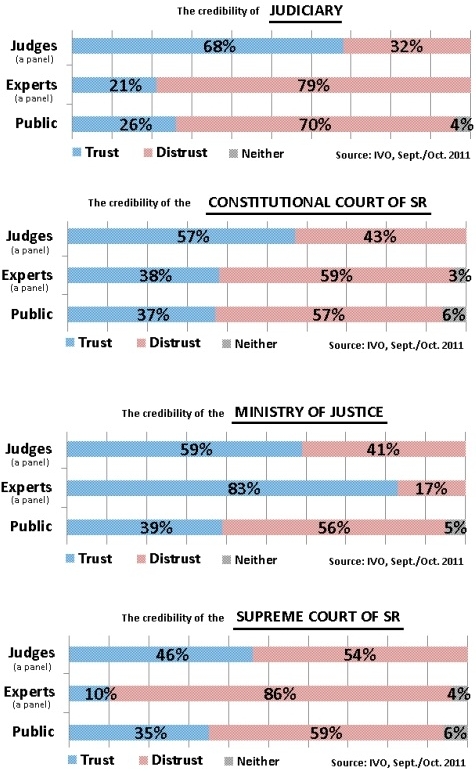Institute for Public Affairs (IVO) carried out a research project Slovak Judiciary as Seen by the Public, Experts, and Judges. The aim of the project is to map opinions of the general public, experts and judges about problems of the Slovak justice system, their causes and potential solutions. Within the project a number of opinion surveys of citizens on a representative sample of the population and opinion surveys of experts and judges in two specially designed panels, are realized.
In September and October 2011, a survey on the credibility of the institutions of the constitutional system of the SR, including the authorities, whose activities are directly related to the situation in the judiciary, was conducted. Institute for Public Affairs also formed a panel of experts and panel of judges, who were answered the same questions as general public.
Results of the first survey (autumn 2011)
Based on the results, beyond the president, lack of public trust prevailed over trust in all of the institutions. Citizens trust courts and the judiciary the least. People have little trust in the Cabinet and parliament, too. Considering the three top institutions whose activity is immediately related with the situation in the judiciary and the rule of law, the Justice Ministry enjoys higher credibility than the Constitutional Court and the Supreme Court.
As can be seen from Table 1, a panel of experts expressed the same opinion as the general public in the case of the judiciary and the Constitutional Court. Experts differ with the general public in the issue of credibility of the Justice Ministry and the Supreme Court. Quite different perception of credibility of these institutions expressed the judges. They trust more all these institutions, especially courts and justice.
Table 1: The credibility of institutions in the justice system and rule of law among citizens, experts and judges (% trust: distrust %)
| Institution |
Public |
Experts |
Judges |
| Justice Ministry |
39 : 56 |
83 : 17 |
59 : 41 |
| Constitutional Court of SR |
37 : 57 |
38 : 59 |
57 : 43 |
| Supreme Court of SR |
35 : 59 |
10 : 86 |
46 : 54 |
| Judiciary (as a whole) |
26 : 70 |
21 : 79 |
68 : 32 |
Source: IVO, September-October 2012
Table 2 shows other main findings of this research, referring to the opinions of citizens, experts and judges on changes in the judiciary after the elections 2010.
As can be seen from Table 2, 42% of the respondents in representative opinion poll attributed to changes, which took a place in the Slovakia’s judiciary after the elections 2010, a positive meaning. A smaller group (33% of respondents) attributed a negative meaning to them, the rest of the respondents were unable to take any approach.
Much clearer view on this issue was expressed by experts and judges. The vast majority of experts – 90% – believed that changes in the laws help to increase openness and transparency in the judiciary. 68% of judges welcome the legislative changes made in the judiciary, while 32% of their perceived them as negative.
Table 2: Opinions of citizens, experts and judges on changes in the judiciary after the elections 2010 (in%)
| |
Public |
Experts |
Judges |
believed that changes
in the laws help to
increase openness and
transparency in the judiciary |
42 % |
90 % |
68 % |
believed that changes
in the laws leads to
the bigger politization
of judiciary |
33 % |
10 % |
32 % |
| Do not know |
25 % |
0 |
0 |
Source: IVO, September-October 2012
Survey conducted by the Institute for Public Affairs shows that Slovakia’s judiciary continues to enjoy an extremely low public trust, a phenomenon recorded for longer time. Although the credibility of the two institutions, representing different approaches to the changes in Slovakia’s justice system – Ministry of Justice and the Supreme Court – in citizens’ eyes are comparable, when it comes to the evaluation of submitted and realized measures, public inclined to evaluate more positively the present performance of the Justice Ministry.
For full results (in Slovak) click here.
The graphs on the credibility of institutions follows.
